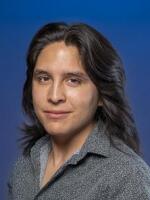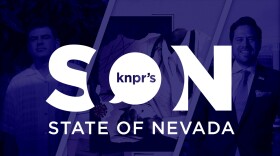Content warning: This story contains discussions of depression and suicide. If you or someone you know is in need of help, contact 988.
Las Vegas has taken to professional football, hockey, and women’s basketball very well as of late, with more on the way.
We’ve all heard about the benefits of sports: building a team mentality, self worth, confidence, dedication. But there's a flip side to that.
A 2021 survey by the NCAA said 38% of U.S. female college athletes and 22% of male college athletes reported feeling consistently mentally exhausted. In addition, rates of anxiety and depression remain 1.5 to two times higher than pre-pandemic levels.
Last year, Las Vegas Raiders quarterback Derek Carr broke down in tears during a press conference, and what happened? People joked about it. The same happened when Simone Biles dropped out of the Olympics a year ago. Olympic gold medalist Michael Phelps and Philadelphia Eagles linebacker A.J. Brown have openly talked about their mental health struggles as well.
Dr. Sheldon Jacobs with Sheldon Counseling has extensive experience counseling professional athletes from the NBA and the NFL. He spoke about the hidden pressures that professional athletes face that can lead to mental health struggles.
"Athletes are a lot of times playing for that next contract. So, if you're not playing up to expectations, that's going to put pressure on you, I don't care who you are. And I think that's something that doesn't get talked about a lot," Jacobs said. "We tend to put them on this pedestal that they are kind of, not normal because of their athleticism. But they're normal people like we do, they listen to social media, they see things on TV just like we do. And depending on the athlete, sometimes they internalize a lot of things that they hear and see. And so if you think about somebody who's young, who has a lot of money, sure they have a lot of money, but they still are human beings just like the rest of us."
So what's being done?
It can begin with UNLV sports psychology professor Bradley Donohue. It's a small world and therapists like Jacobs, to local youth hockey team director Kenny Brooks know who he is.
Donohue is the creator of the sports mental health program TOPPS, or The Optimum Performance Program in Sports program. It is targeted specifically to student athletes from elementary age through college, and it's been implemented from world-class athletes to local sports programs.
"We look at it systemically. We look at the person's life domains and the things they're doing on a day to day basis, as well as their performance in sports," Donohue said. "We typically will go back and forth between life in general and that may include their relationships. It's all related. We work on those different domains, and we try to implement these skill based programs to help them out. I have worked with professional athletes, at a very elite level, and the stigma is real. There's consequences that are associated with that. I think until the field starts to move away from traditional, pathologically focused interventions, to more of a proactive optimization type of focus, I think we're really going to struggle."
What about younger athletes?
We all know that parent screaming at their kid, coach or referee during local games. The pressure is real no matter what age or career level you're at. But is that really the healthiest way of going about it?
Brooks, the director of hockey at the Las Vegas Ice Center, shared some words his father told him when he was an up-and-coming athlete. He claims small things like this can really make a difference in the mental health of any future William Karlsson or Zach Whitecloud.
"One of the best days in my life that I had is when my freshman year at college, I played a bad game. I went up and saw my parents after and my dad instead of saying, 'You did this wrong, you did that wrong,' he just said, 'Good game, son.' What that did is it shifted it from, not only my parents, my friends, everyone else's love, or respect for me isn't necessarily coming off my performance in my sport now. I know that if I perform poorly or I don't play well, that everyone else still loves me; I still have friends, I still have family. Beforehand I know you're told that, but it doesn't hit you until the action is actually taken," Brooks said.
Brooks leads the youth hockey team Las Vegas Storm, and they worked with Stand Tall Counseling and Donohue's TOPPS Program.
Brooks said the way the team communicated with each other improved. One of his players used to quit playing after having a bad play, but after the athlete's participation with the TOPPS program, not only does he not do that, but he helps encourage others to do the same.
And speaking of parents...
Scott Blackford is director of Youth Sports for National Youth Sports Nevada. He and his team of parents and volunteers manage over 9,000 Las Vegas youth in recreational and competitive sports.
It's a big task, and while he does see parents engage in the toxicity of pushing their child to the limit at times, National Youth Sports Nevada is working on educating parents on how to approach sports with their young athletes.
Recreational and competitive sports are two different beasts, both with their pros and cons, but with the same goal: to have fun.
"You see it on both sides, it's a different kind of stress to where on the competitive side you see more of the stress to compete at a high level and to get those championships," Blackford said.
He continued, "On the recreational level, you see a lot of the stress in the kids is coming from the parents screaming on the sidelines when they do just want to go out there and have fun. They don't care about how many goals they score, mostly what they care about is what's the snack is at the end of the game. We're really trying to educate our volunteers, our parents as they go to these games and these events; it should just be: watch them, encourage them. Talk to them about having fun and all the characteristics that sports can bring. And that's where at the recreational level we really want to focus."
National Youth Sports Nevada has recently implemented Donohue's TOPPS program. Only a few athletes are enrolled right now, but they hope more athletes enroll as the program evolves in the organization.
Hear more in the full interview above.
Guests: Dr. Sheldon Jacobs, licensed marriage and family therapist, Sheldon Counseling; Dr. Bradley Donohue, psychology professor, UNLV; Scott Blackford, director of youth sports, National Youth Sports Nevada, Kenny Brooks, director of hockey, Las Vegas ICE Center and Las Vegas STORM Youth Hockey










